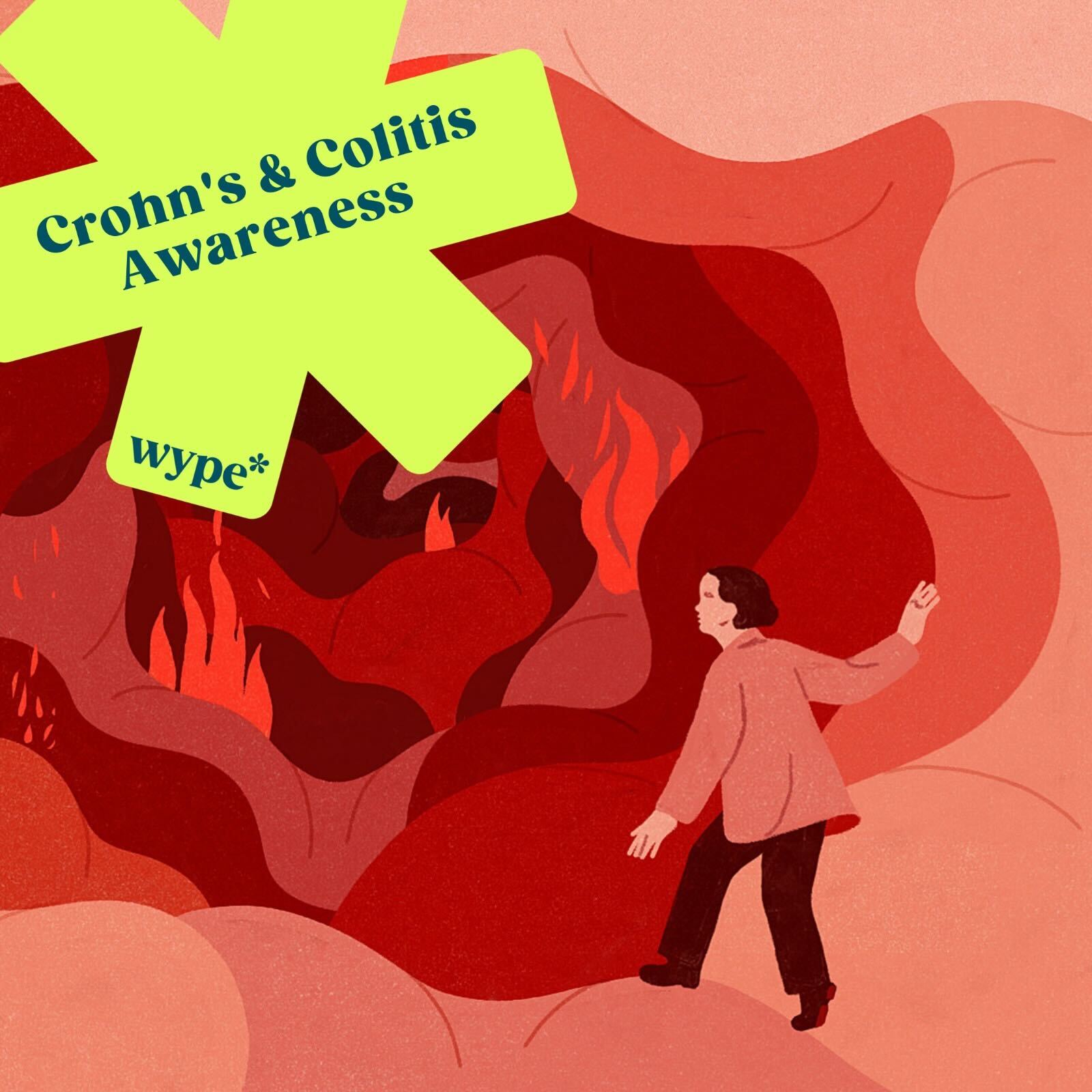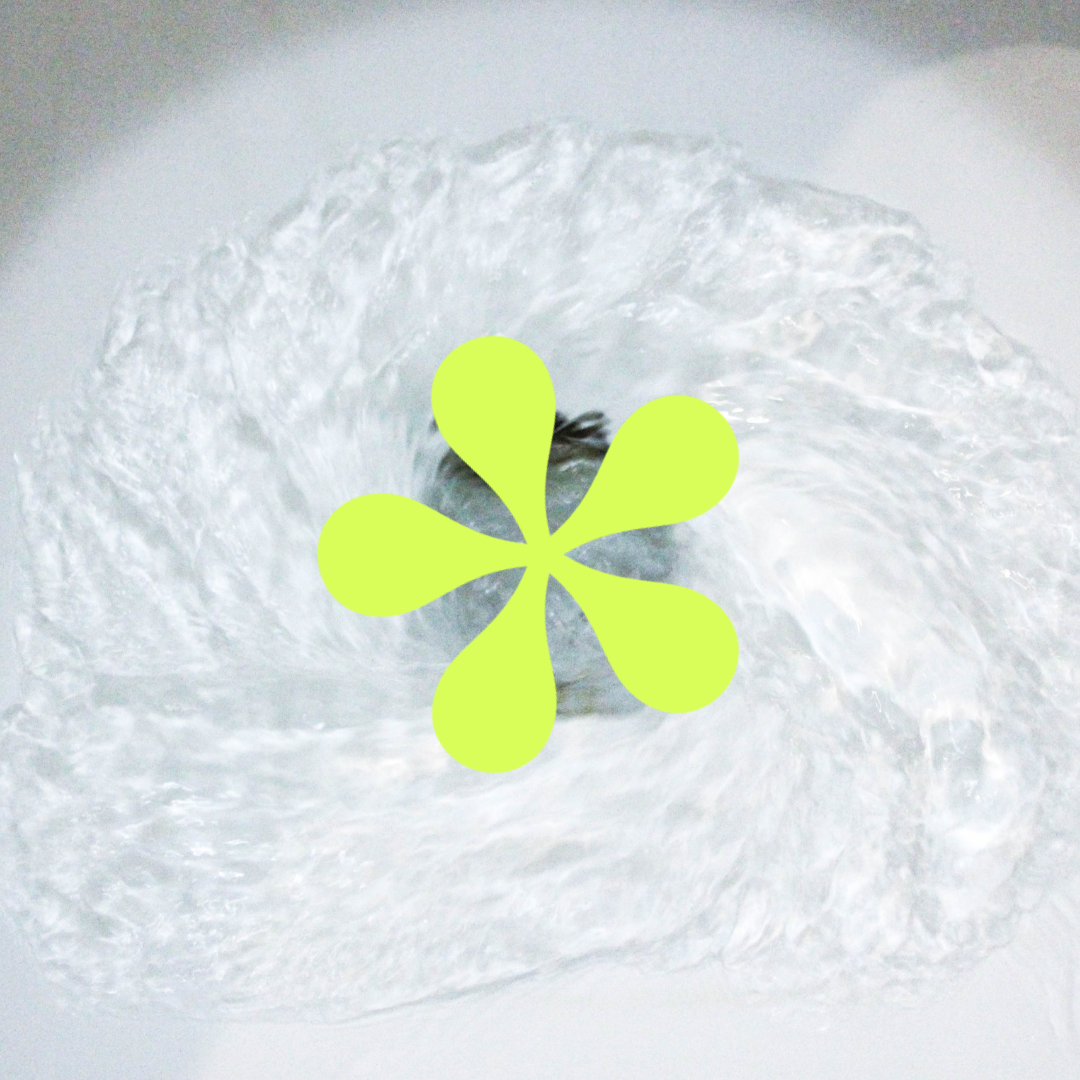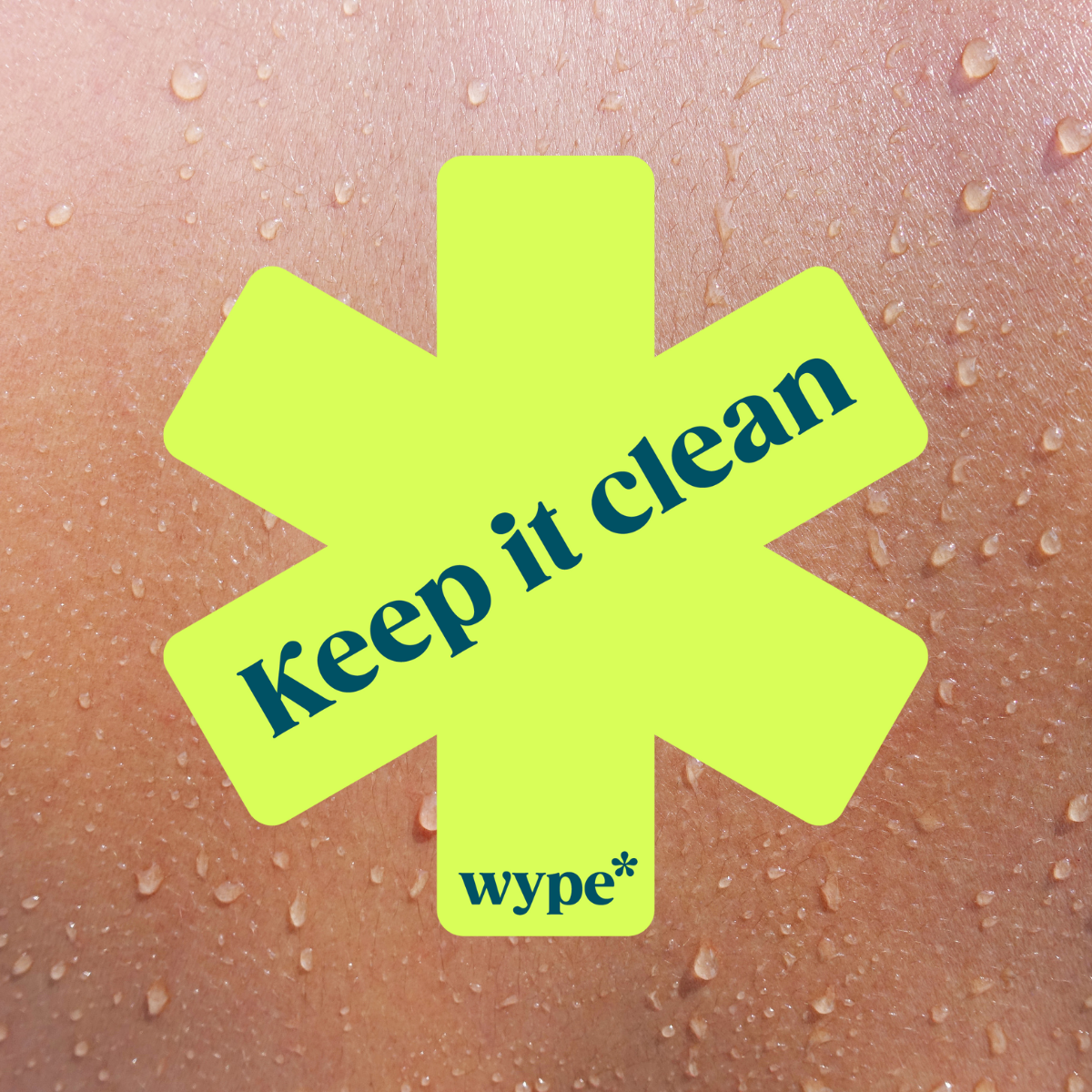Crohn's & Colitis Awareness Week 2022

Crohn's & Colitis Awareness Week 2022
Many of our readers already know that Wype was created as a sustainable wet wipe alternative, and we are proud to say that we have been keeping wipes out of our pipes since 2020. As a brand, we try to provide useful information to our community - but sometimes, we are the ones listening and learning.
One of the things we have been learning is that the Wype community is made up of a variety of people... some are bidet-loving Italians (like our founder), others are burly lads (like our other founder), but there is also a portion of our community who suffer with minor (or not so minor) gut conditions. One of the key learnings we have taken from this year at Wype is that we have a unique opportunity to try and ‘do better’ by those who support us while living with challenges that can affect toilet time.

How are we going to do that, you say? Well on this lovely day, we will be shutting our mugs and leaving the stage to some other voices. 1-7 December marks Crohn’s and Colitis Awareness Week. This year, we have decided to help spread awareness about a disease that is largely invisible, to learn how it can affect people’s lives, and how we can support them in everyday life.
It’s estimated that there are 10 million people worldwide living with diagnosed Inflammatory Bowel Disease (IBD), not to be confused with Irritable Bowel Syndrome (IBS) which is a much more common food sensitivity issue in the gut. IBD is an umbrella term in which Crohn’s Disease and Ulcerative Colitis fall under. These auto-immune diseases cause the immune system to attack different parts of the bowel, leading to inflammation that can bring many different symptoms with it. These include abdominal pain, persistent diarrhoea, weight loss, fatigue, hair loss and much more.
Now we’ve never claimed to be experts and we never would... so for C&C Awareness Week we’ve spoken with 3 people who live with IBD so that they can share their stories and lived experiences.
Here’s who we chatted with!

Lo is Head of Content & Community for a start-up. She says her pet peeves are people slurping their drinks and eating loudly, she wants to know ‘when people thought it was acceptable to eat like that?’ A final pet peeve is saying “no offence” before saying something offensive. No offence, but she’s right. Lo was diagnosed with Crohn’s 7 years ago.
Ellie works in the special educational needs department of a secondary school. When she’s not blocking out the incessant barking from her 18-month-old Labrador, you’ll find her enjoying Mexican food. Anything from fajitas to burritos, she’s your girl. Ellie was diagnosed with Crohn’s 2 years ago, during the height of the pandemic.
James is 31 and works in fundraising. He has his own company (IBD Talks) where he speaks with other people that live with bowel conditions. He hates when people are rude, because “kindness costs nothing.” Too bloody right! James has Ulcerative Colitis.
Let’s jump into what we learnt from this lovely lot.
What's your IBD diagnosis story?
Diagnoses are different for everyone, with varying times of realisation and journeys that can be completely opposite from one another. For example, Ellie’s diagnosis took around 8 months, whereas Lo went through a longer period of being unwell before her diagnosis.
James found out when “I was on a family holiday celebrating my grandad’s birthday and I became so unwell, couldn’t keep food down, couldn’t stay off the toilet.” Ellie found herself with an unusual number of ulcers in her mouth due to inflammation a few months before she was diagnosed. Lo experienced having to go to the toilet 20+ times a day, weight loss, a lot of blood when she was going to the loo and abdominal pains that kept her up at night. These are all common symptoms of IBD.
Ellie mentioned that the “...actual diagnosis itself was less than ideal...I was given my diagnosis in a phone call that lasted, I think less than two minutes...he didn't explain to me what Crohn's was. He just said, yeah, you've got Crohn's disease.”
This led to internet deep dives into what Crohn’s is, having to self-educate on her own condition. “I went on old Mr Doctor Google and had a little look just to see, you know what I felt fit my issues.” This seems to be a recurring situation within IBD diagnoses - when Lo got her diagnoses with Crohn’s, she “did the Googling... you know, *avid typing on keyboard gesture*. Couldn't find anything!” With limited resources in the past, understanding and coming to terms with the condition can sometimes fall onto the person with the condition.
Resources are more accessible now, and symptom checkers are available to check whether you may or may not be presenting signs of IBD.
When it comes to IBD, do you see yourself as being part of a community? If so, what is that and how has it benefitted you?
Ellie’s experience within the IBD community is quite minimal, she said “I was never pointed towards any groups, charities or services, and that's part of it. I feel like if I did, I'd have a bit of imposter syndrome because...I was very unwell, but still not to the extent that some people are and so I feel a little bit of like, well, ‘Who am I to sort of intrude on those spaces’ in a way.”
James, on the other hand, has found himself within IBD communities online. He said, “Social media has been incredible, I really have learnt a lot about myself as a person, personally and professionally and social media inspires me to continually advocate, the communities on Facebook and Instagram are incredible.”
Lo found that she had to go out and find/start a community. She said “Blogging was quite big, and I only found like a handful of blogs at the time. And they were so depressing... it was like, ‘I've just been diagnosed with Crohn's disease. I feel like my life is over.’ And I remember just feeling like, oh God, like, this is so depressing. This is so not my vibe.”
“I love to live as a radiator and not a drain...So I was like no, this is not going to define me.”
"That's why I started my own thing (Gut Instinct)...even if there's one person who finds it. I guess, I was trying to be a bit of a lighthouse and create something, create this tower of content, shine a light and I guess hope that the boats came into me and they did!”
Do you feel like there’s stigma around IBD? Have you personally experienced this and if so, how?
Lo said, “the poo taboo is definitely a real thing, I think. Social media has helped a little bit. I think the more stuff gets spoken about, it definitely feels much more approachable than it did when I first got diagnosed. And that was only, what, 6-7 years ago? So, it's not a lifetime ago, but we have moved on a little bit.”
Some people with IBD haven't experienced this taboo so far. Ellie said, “I’m aware of there being stigma around IBD, however I’m very fortunate that so far, I haven’t been affected by it. I’m very lucky to have great friends/family and a very understanding workplace”
James opened up about the fact that we can’t physically see what IBD is doing to someone. He said, “Things are getting better, the stigma still remains as it’s very much invisible, so people often tell you that you look well when you could be feeling your worst.”
Just because many of the effects of IBD are invisible, doesn’t mean they’re not affecting people every day.
What’s the biggest misconception when it comes to IBD?
Lo further promoted the idea of IBD being an invisible disease, "The classic is ‘you don't look sick’...the assumption that you look fine and so you probably are fine and that probably goes for all health conditions...I've been in more or less remission for about four years. But that doesn't mean I have been without the Crohn's side effects; it’s just my bowels have been a bit better behaved"
Ellie said “I think the one most common misconception would be that it's related to food. So, it's kind of like having a gluten intolerance or a dairy intolerance or that it's sort of caused by food and that. You know these things you can and can't eat? Which isn't strictly the case. It's definitely not caused by food. Although, food can exacerbate or help symptoms.”
Misconceptions come from assumptions, but there’s ways we can better understand what someone with IBD is going through.
What's your advice to those feeling like others don't understand what you're experiencing as someone with IBD?
If you’re someone without IBD, it’s important to know how you can understand what those around you living with the condition are going through. And who better to tell us than someone with IBD?
Ellie said “I think a big one would be not to be afraid to ask questions. You're not going to be able to understand anything about it if you don't ask questions. I think if you're being respectful and considerate and kind with your questions, that's perfectly fine and helps promote a healthy conversation about it.”
Lo said, “I think there's so many amazing ways you can just lightly say how are you doing today? I'm here if you want to talk, it doesn't matter if not. And I think also just making sure that you do that more than once. Sometimes people think, ‘oh, I asked her once, she said she was fine, I don't need to ask again.’...just gently allowing that person to know that it’s like a safe space.”
What are some things that people without IBD can do to support their friends and others with IBD?
Lo made an interesting point about the workplace and IBD, “If you're an employer or you have a colleague with IBD, you can let them know that it's a safe space, or that it’s okay for them to take a day off as a sick day. If they would still want to work, are they able to work from home? Whatever you're able to do to lighten the load.”
Ellie gave a more general approach, “I think to be patient because Crohn's can be, you know, some days you can have an absolutely amazing day and then other days you're stuck in your house all day, can't get out of bed, can't leave the toilet. And so, I think being patient with someone is really important because it can be really life limiting depending on where you are and your situation, medication and things like that. And it can be quite restrictive to what you can and can't do.”
James echoed this – “ask the person who is living it what it feels like, sometimes we just need someone to understand that we can’t always do things we used to do.”
Find out more ways to support a loved one with Crohn’s here!
What's a question you wish you would get asked?
Lo: “Rather than 'how are you?', maybe more like, 'what am I not seeing about your Crohn’s?' Or 'what don't I know about your Crohn’s?'”
Ellie: “I think, maybe how it affects everyday life. I think that would definitely be one thing that people maybe don't understand as much as the day-to-day effect it has like fatigue for example. Even if you're not going through a flare up, your symptoms are in what's called in remission.”
James: “How’s your mental health? Are you struggling because you’re unwell?”
Crohn’s and Colitis are invisible health conditions - we can be more mindful with our questions and understand how we can best support when needed.
They say mind over matter, do you feel like mindset plays a part in your condition and how?
Here’s Ellie’s thoughts on this one. “I think it comes into in with coping, and coming to terms with it because it's a lifelong thing. You can't get rid of it, you can't cure it, it's going to be with you forever. I think you have to adjust your mindset to cope with that and be okay with it because otherwise you would just be a mess all the time - it's quite a hard thing to come to terms with. But also, it's manageable and there are lots of treatment options available, and it is liveable. So I think mindset definitely comes into it."
James said, “Oh yes definitely, when you are not feeling 100% your mental health can also slip, sometimes it’s a juggling act and sometimes it’s crashing and burning. I know sometimes if I spend a lot of time dwelling on feeling unwell, I start to feel mentally unwell too”
Lo mentioned that “It's twofold. I don't think that, you know, drinking green tea and thinking positively is going to mean that you are a healthy little bean. I don't think it hurts, but I don't think it's the golden cure, but the gut and the brain are like soul sisters - they're so intrinsically linked! And everyone who I've ever met with Crohn's or not, if you're hyper stressed out and in a bad mood and just down, you'll probably have an upset stomach. It's like when you're nervous you have a dodgy tummy or when you're really anxious, you have a really upset stomach. So, I think in that way, yeah, mindset has a really big part to play in it. And I'm not saying you can think yourself off the toilet. But you can definitely be very cognisant of how your mind, your mindset and how you think about your day-to-day life can help manage it.”
A message from the Wype team
We’d like say a massive thanks Lo, James, and Ellie for speaking with us and sharing their stories! It's been amazing to be able to push these experiences out there. We hope that us giving the stage over to people with IBD has given some insight into how we can support and understand those around us living with these conditions.
You can find some helpful resources below, and on the Crohn’s and Colitis through the Crohn’s and Colitis UK website.

Crohn's & Colitis UK
Crohn's & Colitis Symptom Checker
Crohn's and Colitis Helpline (phone & live chat)
Supporting someone with Crohn's or Colitis
Crohn's and Colitis UK - All information on Crohn's and Colitis



Thank you for raising awareness of C&C. The article is engaging, honest and enlightening.